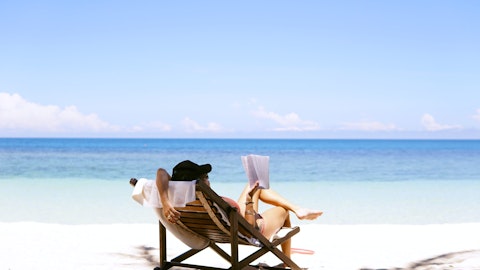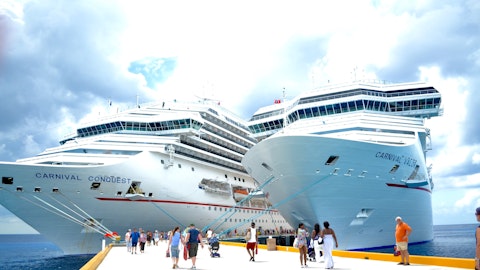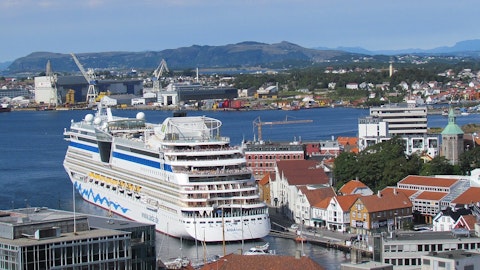Dolf Berle: Alex, I am so glad that you asked about that. So, as a reminder to those who might not be so familiar, we had a long relationship with the Sea Cloud Company, and the original Sea Cloud has been just a fantastic charter for us for many years. So, it’s on the strength of that experience that we wanted to expand the relationship to yet another ship, the Sea Cloud II, which will have that same general geographic orientation actually, Alex. The greater Mediterranean and then down into the Caribbean is where these ships are designed to go and these are sailing ships. They’re a different experience onboard, more of a historic kind of formats and sailing experience for real sailing enthusiasts. So, we consider this to be not only just a beautiful way for guests to be in these geographies that we spend a little bit less time and frankly with our existing fleet, but also add guests who come in through the sort of the vantage point of sailing, but then can learn more about the broader expedition products that we offer throughout the world.
And so, we consider this strategically helpful, but certainly also financially and audience building.
Alex Fuhrman: Okay. That’s really helpful. Thanks very much.
Dolf Berle: You need to go. Alex, you need to go. Take the trip.
Operator: Our next question is from Ryan Sundby from William Blair. Ryan, your line is now open. Please go ahead.
Ryan Sundby: Hey guys, good morning. Congrats on another nice quarter here. Dolf or Craig, I guess, outside of the headwinds you’ve kind of covered here so far, can you talk a little bit about what you’re seeing from the consumer and from the macro backdrop here? Any changes to the guest mix or signs of shift down in terms of lower priced rooms or itineraries or even shorter duration trips?
Craig Felenstein: Sure. Thanks, Ryan. So, a couple of things on the guest demographic side of the house. First and foremost, if anything, we’re actually seeing a shift more to the up rather than the down. What you’re seeing across the fleet is aside from the price points that we’re maintaining or rising on our — what I would say is more traditional fleet. The newer price points on some of our newer inventory is at a higher level and we are having no problems getting those price points at the occupancy levels that we’re getting across the entire fleet. So, the price point shift has actually been very, very positive. With regards to any kind of other shifts, with regards to our guests, the only thing, I would say, has changed a little bit here in the short term, this is really just during the wave season, is we are seeing newer guests as a percentage versus repeat guests, which is always higher during wave season.
We tend to get newer guests during wave season than we get repeat guest. But the skew has been a little bit more towards the newer side, not dramatically, but a little bit. So, I think that’s one thing I would point out. The other thing that I would point out is we are seeing — and Dolf talked a little bit about our marketing strategy and our marketing success in his comments, we are seeing more direct business right now as a percentage of our overall business than we are seeing from other sources. So those would be two of the shifts that we’re seeing, but all really positive with regards to the guests and their demand.
Dolf Berle: Ryan, I’ll just briefly add to that. I think a lot of this is a function of the work that we’re doing with search engine optimization. And so, we’re just seeing a higher incidence of people, particularly for our core geographies such as Antarctica, Galapagos and Alaska, that are coming in from the web as opposed to in response to brochures or letters or emails. And so, that’s been nice to see and we hope we can continue that throughout the year.
Ryan Sundby: That’s great to hear. And then, Dolf, I thought you sounded excited about pursuing a dual-pronged strategy here, both organic and — and organically. I guess given the success you’ve seen on the land-based side, are you looking more actively there, or are you seeing upstreams out there like what you were able to do with Islander II?
Dolf Berle: I think — I don’t think that we have a strong preference for one versus another. We’re just focusing on the very best guest experiences that we know will be appealing to our guests, and we’re trying to make sure that we pay for something that we know we can grow, but at a price that we think is accretive. And so, in my mind, where our approach and the people inside the company who are doing this are looking not only at land company opportunities, but also ships, and even companies that have ships and maybe based elsewhere in the world that have sales and marketing organizations and operating infrastructure that would allow us to create a new base of operation from which to build and serve guests all over the world.
So, I wouldn’t say that we’re leaning one way or another and I feel good about the quality of our diligence and the way we were able to work, particularly with founders and family companies that are looking for a good next step by selling to a company such as ours, who knows that we care about their guests and trying to do good work in the world and for the world. And so shared ethos is probably as important as anything else when we are looking at opportunities.




